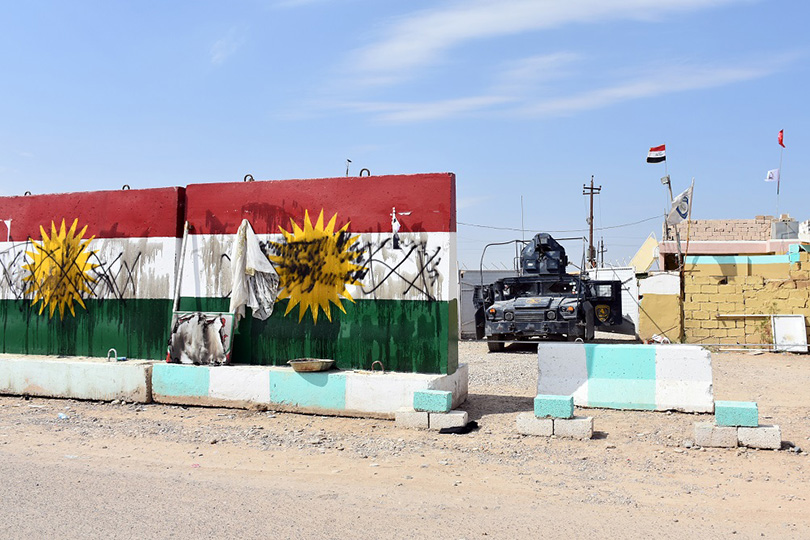Iraqi forces marched into the centre of Kirkuk on Monday and flew the national flag as divisions among the Kurdish groups led to factions of peshmerga refusing to fight in an act described as "treason" by their superiors.
Forces including the Shia-dominated Popular Mobilisation Units took key facilities around Kirkuk, including the K1 military base, the military airport and oilfields, before a convoy of elite Iraqi counter-terrorism unit forces took control of the governorate building in central Kirkuk in the afternoon, meeting no resistance.
Iraqi forces also took control of the governor's office, which had been left deserted, the federal police chief said.
The peshmerga forces on frontlines to the south of the city, mainly from the Patriotic Union of Kurdistan (PUK) faction of the Kurdish Regional Government, refused to fight and fled, leaving the way open for the Iraqi side.
Their withdrawal led to accusations of "treason" from peshmerga aligned with the ruling Kurdistan Democratic Party (KDP) of the Kurdish president, Masoud Barzani, and statements that Baghdad would pay a "heavy price" for its actions.
In a statement, the general command of the peshmerga told Middle East Eye: "We are saddened to say some officials within the PUK collaborated in this plot and betrayal against the Kurdistani nation. They deserted key points to Hashd and Iranian forces according to secret pre-arrangements."
Iraqi tanks were filmed destroying posters of Barzani in Kirkuk.
But it is the loss of the city, and that of oil and military installations to the north, that represents a huge setback for the KRG's plans of independence, as it loses key oil-producing territory it has held since ejecting Islamic State from the area three years ago.
Baghdad and the KRG have been locked in a standoff after a Kurdish referendum backed independence. The PUK has since supported UN-backed plans for negotiations with Baghdad in exchange for dropping the referendum result, while the KDP has refused negotiations.
Thousands of civilians were reported to have fled Kirkuk in the face of the Iraqi advance, heading for Sulymaniyeh and Erbil. Other civilians were seen cheering on the Iraqi forces as they entered Kirkuk's southern outskirts.
"We're leaving because we're scared there will be clashes," said 51-year-old Chounem Qader.
At least 10 Kurdish fighters have died in limited clashes, according to officials.
Iraq's prime minister, Haider al-Abadi, gave instructions that the Iraqi flag be hoisted in Kirkuk and other territories claimed by both the Iraqi government and the KRG.
Abadi said the military operations were necessary to "protect the unity of the country, which was in danger of partition" because of the referendum.
"We call upon all citizens to cooperate with our heroic armed forces, which are committed to our strict directives to protect civilians in the first place, and to impose security and order, and to protect state installations and institutions," he said.
Patrick Osgood, a former Kurdistan bureau chief at Iraq Oil Report, said the focus would now fall on two oilfields still controlled by the KDP faction, and possibly decide the fate of the Kurdish push for independence.
"Two large oilfields a bit further west of Kirkuk, Bai Hassan and Avana, are under KDP management and KDP peshmerga control," he said.
"They contribute 280,000 barrels of oil a day to the KRG's total of 600,000 barrels a day.
"They are completely integral to the KRG’s economy and the KRG would sink very rapidly without that oil production."
The US-led coalition against Islamic State called for dialogue between Iraqi and Kurdish authorities.
"All parties must remain focused on the defeat of our common enemy, IS, in Iraq," Robert White, a commanding general in the coalition, said.







Comments